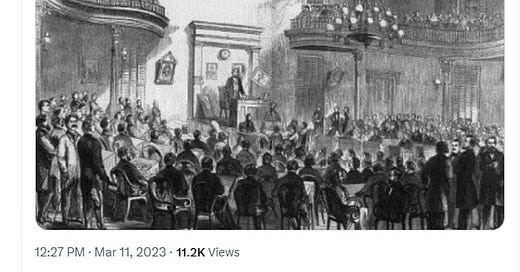In this 2023 series, I’ve been looking at ways that the democratic tradition developed – and sometimes regressed – in American history. With particular reference to issues involved in understanding the Civil War and Lost Cause pseudohistory.
In dealing with Lost Cause malarky, some things are pretty straightforward. Like the iconic and ludicrous claim that Confederate secession and treason had nothing to do with slavery:
But when looking at the history of democratic governance and human rights, it’s both fascinating and frustrating that progress in some areas can and does take place at time of retrogression in others. So I though it would be useful at this point to think about some of more significant developmental periods, which I can be blocked out like this:
American Revolution (1775-1783)
Establishing the Constitutional government (1789-1801)
“Jacksonian” reform era: labor, expansion of suffrage, anti-slavery, utopian experiments, fight against the “Money Power,” aka, Bank of the United States.
Civil War: emancipation of the slaves
Reconstruction in the South (1865- ca. 1880)
Populist/Progressive movements (late 19th/early 20th century)
Women’s rights/women’s suffrage, aka, voting rights
New Deal-Great Society: union movement, social-democratic policies
Post-WWII civil rights advances: voting, abortion rights, cultural liberalization
But the concepts of contradiction and contradictory development in history is also important to keep in mind. As the title of this blog/newsletter might indicate, I think those are important factors in looking at politics and history.
If “contradiction” gives you the heebie-jeebies because it sounds too Marxist-y or something, think of it as “Hegelian” contradiction, because Marx actually picked up that general notion from him. Marx and his close collaborator Fredrich Engels followed the Civil War in the US closely and published on it contemporaneously. Like most of the active labor movement in Britain where they lived, they were enthusiastically pro-Union.
In terms of American political history, including those connected with the Civil War and our ever-evolving understanding of them, the development of democracy, personal freedom, and social justice has always involved some form of things getting better and things getting worse at the same time.
If we take the period of 1945-1973 in the US, Canada and western Europe that was generally a period of expanding individual rights and social-democratic programs of public education, health, housing, and public health – even though it was considered uncouth in the US to refer to them as “social democratic.” Ironically, that period is now also commonly referred to as the Golden Age of Capitalism.
Since 1980 at the latest in the US, we have experienced “neoliberal” decades of the rise and strengthening of “market economy” policies, reduction of labor bargaining power, vast increases increase in income inequality, and an enormous increase of legalized corruption in the form of campaign contributions. We’ve recently seen rollbacks in protections for voting rights and a drastic change in 2022 reducing abortion rights and therefore women’s rights more generally.
And yet during those times there have been democratic developments: expanded protection and support for LGBTQ rights, a revitalized women’s movement especially after 2016, the Occupy Wall Street that reshaped to political understanding of the concentration of wealth and income, the Black Lives Matter movement, a continually growing environmental movement, a small-d democratic response to Trump and his 2021 insurrection. And the US is in the midst of one of the most significant periods of labor activism and union organizing in decades.
It's easier to bracket a particular period in the past and define it as a time of progress or reaction than it is with times closer to the present. Because we know what happened after, say, FDR’s election in 1932. But nobody knew all those things at the time.
One important general advance in our understanding of the American past – and one that Trumpistas are now desperately trying to reverse – is that it is more common now to understanding that advances in the main (predominately white) political community since 1776 were also marked by policies on slavery, race, colonialism in North America and elsewhere, and serious excesses of war and militarism, which are hard to view as anything other than retrograde tendencies.
The Trumpistas with their anti-textbook and Patriotic History pushes are trying to undercut an honest view of that history.



